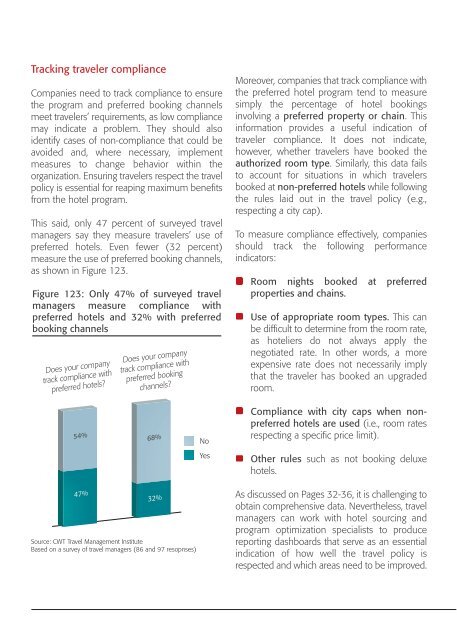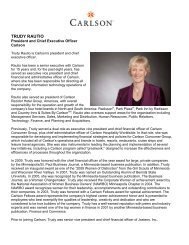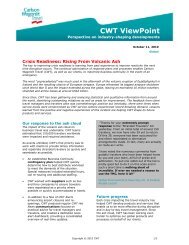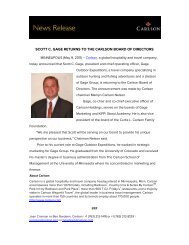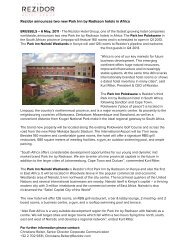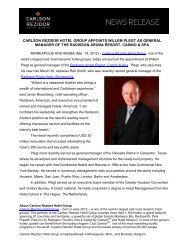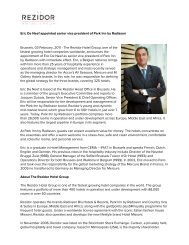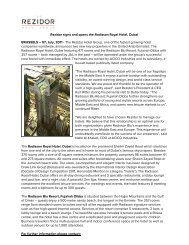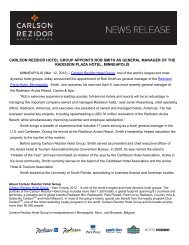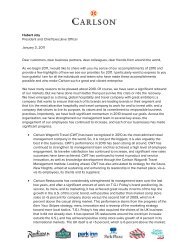Room for Savings: Optimizing Hotel Spend - Carlson
Room for Savings: Optimizing Hotel Spend - Carlson
Room for Savings: Optimizing Hotel Spend - Carlson
Create successful ePaper yourself
Turn your PDF publications into a flip-book with our unique Google optimized e-Paper software.
Tracking traveler compliance<br />
Companies need to track compliance to ensure<br />
the program and preferred booking channels<br />
meet travelers’ requirements, as low compliance<br />
may indicate a problem. They should also<br />
identify cases of non-compliance that could be<br />
avoided and, where necessary, implement<br />
measures to change behavior within the<br />
organization. Ensuring travelers respect the travel<br />
policy is essential <strong>for</strong> reaping maximum benefits<br />
from the hotel program.<br />
This said, only 47 percent of surveyed travel<br />
managers say they measure travelers’ use of<br />
preferred hotels. Even fewer (32 percent)<br />
measure the use of preferred booking channels,<br />
as shown in Figure 123.<br />
Figure 123: Only 47% of surveyed travel<br />
managers measure compliance with<br />
preferred hotels and 32% with preferred<br />
booking channels<br />
Source: CWT Travel Management Institute<br />
Based on a survey of travel managers (86 and 97 resopnses)<br />
No<br />
Yes<br />
Moreover, companies that track compliance with<br />
the preferred hotel program tend to measure<br />
simply the percentage of hotel bookings<br />
involving a preferred property or chain. This<br />
in<strong>for</strong>mation provides a useful indication of<br />
traveler compliance. It does not indicate,<br />
however, whether travelers have booked the<br />
authorized room type. Similarly, this data fails<br />
to account <strong>for</strong> situations in which travelers<br />
booked at non-preferred hotels while following<br />
the rules laid out in the travel policy (e.g.,<br />
respecting a city cap).<br />
To measure compliance effectively, companies<br />
should track the following per<strong>for</strong>mance<br />
indicators:<br />
<strong>Room</strong> nights booked at preferred<br />
properties and chains.<br />
Use of appropriate room types. This can<br />
be difficult to determine from the room rate,<br />
as hoteliers do not always apply the<br />
negotiated rate. In other words, a more<br />
expensive rate does not necessarily imply<br />
that the traveler has booked an upgraded<br />
room.<br />
Compliance with city caps when nonpreferred<br />
hotels are used (i.e., room rates<br />
respecting a specific price limit).<br />
Other rules such as not booking deluxe<br />
hotels.<br />
As discussed on Pages 32-36, it is challenging to<br />
obtain comprehensive data. Nevertheless, travel<br />
managers can work with hotel sourcing and<br />
program optimization specialists to produce<br />
reporting dashboards that serve as an essential<br />
indication of how well the travel policy is<br />
respected and which areas need to be improved.


